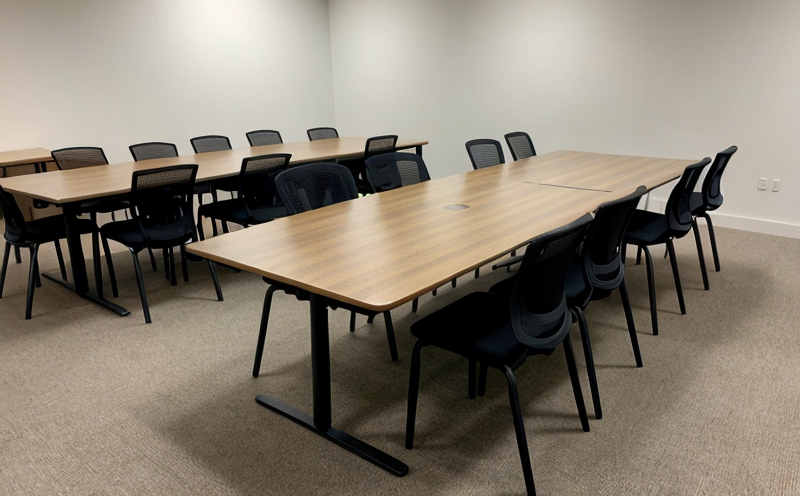BS EN 581-3 Outdoor Furniture Mechanical Testing for Tables
The British Standard (BS) and European Norm (EN) standard BS EN 581-3 is specifically designed to provide guidance on the mechanical testing of outdoor furniture, including tables. This standard ensures that outdoor furniture products are robust enough to withstand various environmental conditions such as wind, rain, sun exposure, and temperature fluctuations over extended periods.
The primary focus of BS EN 581-3 is to assess the structural integrity and durability of outdoor furniture under mechanical loading tests. This includes static load testing, dynamic load testing, and fatigue testing which are crucial for ensuring that tables can safely support intended loads without failure or excessive deformation. The standard also addresses the stability requirements of the furniture when subjected to these forces.
The BS EN 581-3 testing process involves several stages. Specimens are prepared according to defined dimensions and materials specified in the standard, followed by application of various mechanical loads intended to replicate real-world usage conditions. Testing typically includes load tests on the table top, legs, and joints, using equipment such as universal testers or dedicated furniture test rigs.
The results from these tests are then compared against acceptance criteria laid out in the standard, which vary based on the specific type of outdoor furniture being tested. Compliance with this standard is essential for manufacturers to demonstrate that their products meet stringent quality and safety requirements set by regulatory bodies across Europe.
Compliance can significantly enhance brand reputation and consumer confidence, ensuring long-term satisfaction among end users who rely heavily upon durable and reliable outdoor furniture pieces.
Benefits
- Enhanced Product Quality: Ensures that the product meets rigorous mechanical performance standards, leading to higher satisfaction levels among consumers.
- Predictable Performance: By simulating real-world conditions through testing protocols, manufacturers can predict how their products will perform over time, facilitating better design decisions.
- Regulatory Compliance: Meeting the requirements of BS EN 581-3 helps companies avoid potential legal issues and recalls associated with non-compliant products.
- Improved Brand Image: Demonstrating adherence to international standards like this one can significantly boost a company’s reputation in the market place.
Eurolab Advantages
EuroLab offers comprehensive testing services aligned with BS EN 581-3, providing clients with expertise and resources necessary to ensure compliance. Our team of qualified engineers and technicians has extensive experience in conducting mechanical tests on outdoor furniture, ensuring accurate results that comply with all relevant standards.
Our state-of-the-art facilities are equipped with sophisticated testing equipment capable of replicating a wide range of environmental conditions found outdoors, allowing us to simulate realistic stress scenarios for our clients’ products. This approach ensures that we can provide detailed reports based on actual performance data, giving manufacturers valuable insights into potential improvements needed before going to market.
Furthermore, Eurolab’s commitment to excellence extends beyond just technical expertise; it also includes an understanding of the broader business context faced by furniture makers today. We work closely with our clients throughout every stage of the testing process, offering guidance and support tailored specifically to their needs. From initial consultation through final report delivery, we ensure that each client receives personalized attention that contributes towards achieving their goals.
Use Cases and Application Examples
| Use Case | Description |
|---|---|
| Structural Integrity Assessment: | Testing the ability of a table to withstand static and dynamic loads without failure. |
| Stability Evaluation: | Evaluating how well the legs remain stable under varying wind speeds or impacts from objects like chairs being pushed back into place. |
| Fatigue Testing: | Determining whether repeated cycles of loading and unloading lead to premature failure or degradation in performance over time. |
| Weather Resistance Check: | Assessing how well the materials used in construction resist damage from UV radiation, moisture, temperature changes, etc., ensuring longevity outdoors. |





